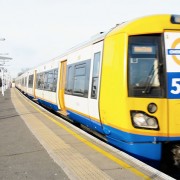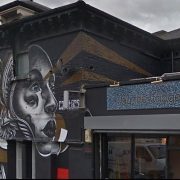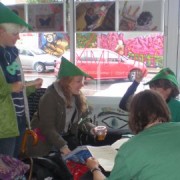
People in Old Spitafields market Pic: Garry Knight (Flickr)
Experts and industry bodies have strongly criticised the decision to introduce a late night levy in Tower Hamlets, which could see nighttime venues close.
Tower Hamlets Council has announced that the levy will come into force in the new year, after a legal challenge by The Association of Licensed Multiple Retailers (ALMR) initially halted the move in May.
The levy will see over 300 businesses selling food and alcohol after midnight paying a charge to fund the costs of policing nightlife in the borough.
However, amid concerns that London’s nightlife is already under threat, experts are warning that the levy would stifle investment, put jobs at risk and could ultimately see venues close.
Mark Davyd, CEO of the Music Venue Trust, which was established in 2014 to protect grassroots music venues, told Eastlondonlines: “It is painfully idiotic to introduce a new tax into a sector that is already struggling.”
Comparing the levy to recent rises in business rates, he said “a tiny change in the finances will result in closures”, because the current financial health of the sector was “extremely precarious”, with lots of venues “on the breadline”.
“If people don’t know how many venues have closed and how many are under threat, they shouldn’t be in charge of making decisions,” he said.
“Every venue that closes in Tower Hamlets as a result of this is directly the responsibility of the councillors who introduced it as a reasonable idea.”
He added there was no evidence the levies are used directly to bring in additional control measures to police late night activity.
ALMR Chief Executive, Kate Nicholls, said: “Obviously, this is a very disappointing decision from Tower Hamlets council, one which will put further financial pressure on valuable businesses in the area.
“The ALMR’s submission to the council clearly highlighted the dangers of introducing a levy and was supported by a petition from local venues opposed to the measure,” she said.
“It is very disappointing to see the council ignoring the concerns of its own businesses in favour of a measure that will put the area’s late-night offering at risk and, in all likelihood, have no appreciable positive impact.”
Vibe Bar on Brick Lane closed in 2014. Pic: Google street view
More than 300 premises are likely to be affected by the policy, according to council figures, despite hotels, theatres and cinemas, as well as community premises including like sports clubs being exempt from the charge.
The policy will raise up to an estimated £300,000, as busninesses are forced to pay between £300 and £4,440 per year, depending on their size and rateable value.
A similar levy is set to be introduced in Hackney, which local venues and industry figures have also condemned as a threat to the local nighttime economy.
Eastlondonlines ran a series earlier this year looking at why so many nightclubs had closed across London.
Estimates from the Night Time Industries Association (NTIA) suggest the number of nightclubs in the capital has almost halved over the last decade.
Amy Lamé, who was appointed as London’s first Night Czar to help protect the capital’s nightlife, told Eastlondonlines: “The Mayor and I want to see London become a truly 24-hour city.
“London’s diverse night-life is world renowned, and nowhere is this more true than in Tower Hamlets, where you have legendary night-time hotspots in Shoreditch, Spitalfields and Brick Lane.
“It’s vital that businesses, local authorities, police, revellers and residents all work together to ensure that Tower Hamlets is able to create a 24-hour night-time economy and culture that works for everyone.”
After years of venues shutting down, this year there had been a “distinct decline in the number of venues closing”, according to Davyd, as the overall numbers began to stabilise.
There were also emerging reasons for hope, as Lamé was appointed and the club Fabric was reopened amid a fierce public debate.
However Davyd said the rise in business rates and a new wave of development applications has plunged lots of venues back into crisis.
John Biggs, the mayor of Tower Hamlets, said: “The borough has a vibrant night time economy which we want to support. The late night levy is a way to ensure a financial contribution from businesses that sell alcohol between midnight and 6am is ring fenced for this purpose.”
Biggs said the move would allow the council to “tackle anti-social behaviour” and “reduce alcohol-related crime”, adding he was keen to hear from businesses and residents about the proposals.
Councillor Asma Begum, cabinet member for community safety, said the levy was crucial in making businesses pay their “fair share of the costs” that result from things anti-social behaviour.
One of a number of lost venues across the borough in recent years was Brick Lane’s Vibe Bar, which closed after 20 years in 2014, because of increased issues with acquiring Temporary Event Notices (TEN) allowing the bar to be open after 1am.
Before its closure, the premises was forced by police to introduce ID scanners, a curfew on their courtyard, and a pilot scheme requiring clubs to breathalyse punters on entry.
Another was Public Life, which had its license revoked by Tower Hamlets Council in 2012, after a long campaign to save it led by the local community failed.




